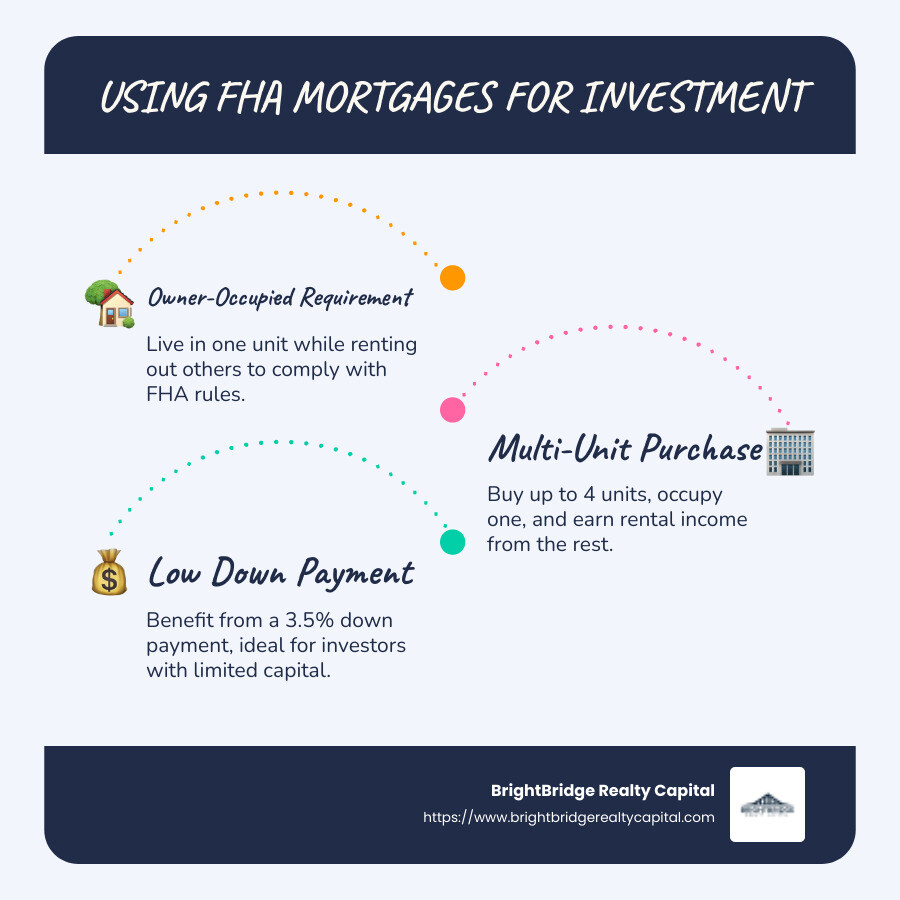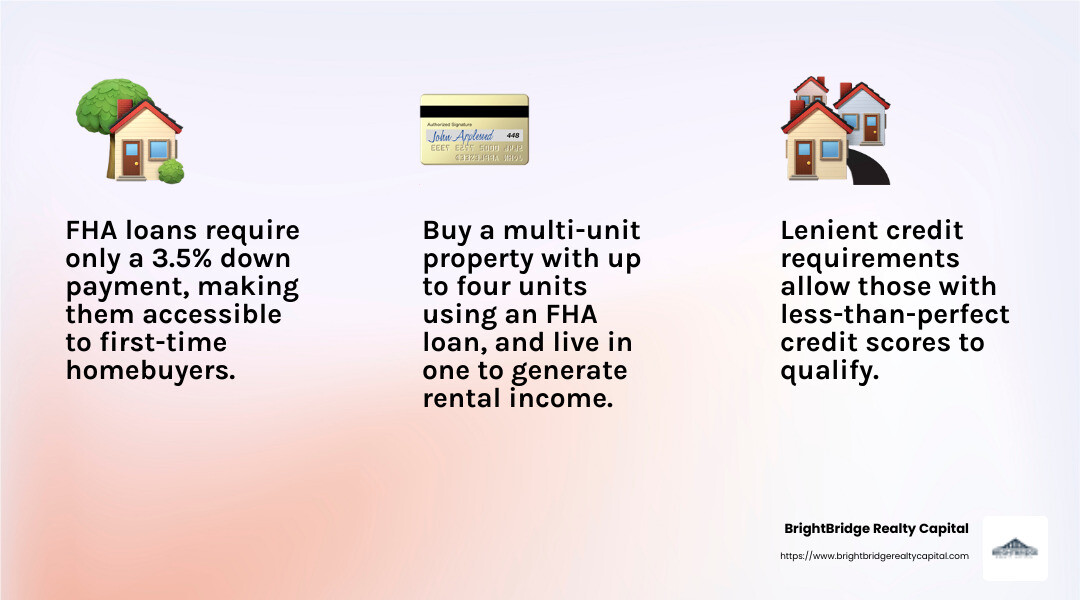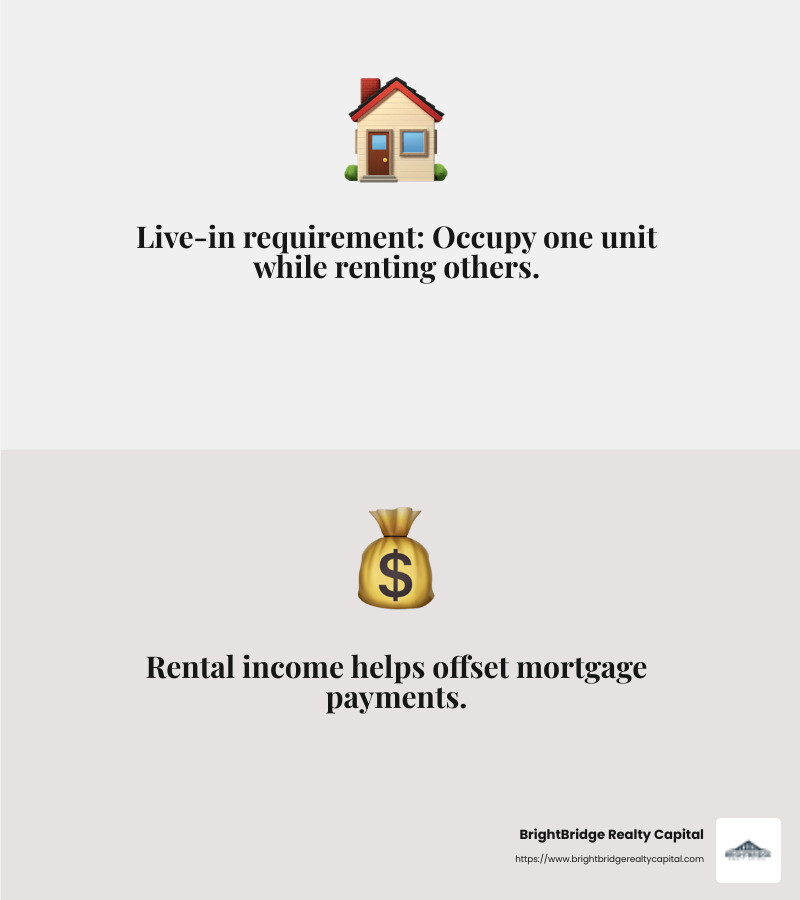Investing with FHA: A Guide to Using FHA Mortgages for Investment Properties

FHA mortgage for investment property is a topic of interest for many real estate investors seeking to leverage affordable financing options. While FHA loans are primarily designed for owner-occupied properties, they hold unique opportunities for strategic investment. Here’s a quick breakdown of the essentials:
- Owner-Occupied Requirement: FHA loans necessitate the owner to occupy one of the units if investing in multi-unit properties.
- Multi-Unit Strategy: You can purchase a building with up to four units, reside in one, and rent out the others.
- Lower Down Payments: FHA loans offer down payments as low as 3.5%, ideal for investors with limited capital.
- Lenient Credit Requirements: Easier access for those with lower credit scores compared to conventional investment loans.
Leveraging FHA loans for investment properties requires a nuanced understanding of these aspects. By employing strategies like "house hacking," where you live in one unit while renting out others, investors can smartly build their portfolios. It's about blending affordability with strategic property investment, turning a primary residence loan into a pathway for generating rental income.

Common fha mortgage for investment property vocab:
- buying rental property with fha loan
- owner occupied loan for investment property
- conventional loan for investment property
Understanding FHA Loans
FHA loans are a popular choice for many homebuyers due to their flexible requirements and lower barriers to entry. Let's break down the basics and see how they can be used effectively, even for investment purposes.
FHA Loan Basics
FHA loans are designed to help individuals buy homes with fewer financial problems. Here are some key features:
Low Down Payment: You can get started with as little as a 3.5% down payment. This is significantly lower than the typical 20-25% required for conventional loans.
Lenient Credit Requirements: Even if your credit score isn't perfect, you might still qualify for an FHA loan. This makes homeownership more accessible to people who might otherwise be turned away.
Primary Residence Requirement: When you get an FHA loan, you must use the property as your primary residence. This means you need to live in the home you purchase, at least initially.
Multi-Unit Properties: You can use an FHA loan to buy a building with up to four units. The catch? You must live in one of them. This opens up opportunities for generating rental income from the other units.
FHA 203(k) Loans
The FHA 203(k) loan is a special type of FHA loan that allows you to finance both the purchase and renovation of a home. Here's how it works:
Home Renovation: Whether you're fixing up a single-family home or a unit in a multi-family property, an FHA 203(k) loan can help cover the costs of repairs and upgrades.
Property Standards: The property must meet certain minimum standards set by the FHA. This ensures that the home is safe and livable.
Streamlined Process: The 203(k) loan combines the home purchase and renovation costs into one mortgage, simplifying the financing process.

Using FHA loans, including the 203(k) variant, can be a smart move for those looking to enter the real estate market without a large financial burden. Whether you're planning to live in your new home or use a multi-unit strategy to earn rental income, these loans provide a flexible and accessible path to homeownership and investment.
Using FHA Mortgages for Investment Properties
If you're thinking about using an FHA mortgage for investment property, you'll want to understand how multi-unit properties and specific FHA requirements play into this strategy. Let's explore how you can leverage FHA loans to build your real estate portfolio.
Multi-Unit Properties
One effective way to invest using an FHA loan is by purchasing a multi-unit property. These properties can have up to four units. The key requirement? You must live in one of them. This is known as the live-in requirement.
Why is this strategy beneficial? Because living in one unit allows you to rent out the others, generating rental income. This income can help offset your mortgage payments, making this strategy known as house hacking. Imagine living in one unit while your tenants help pay your mortgage—it's a win-win situation!

FHA Loan Requirements for Investment
When using an FHA mortgage for investment property, there are specific rules and requirements you need to follow:
Occupancy Rules: You must occupy one of the units as your primary residence within 60 days of closing and live there for at least one year. This is crucial for maintaining compliance with FHA guidelines.
Loan Limits: FHA loans have limits based on the area and the number of units in the property. It's important to check these limits to ensure your desired property falls within the allowable range.
Mortgage Insurance: FHA loans require mortgage insurance premiums (MIP). These include an upfront premium and an annual premium, which are added to your monthly mortgage payments. While this is an extra cost, the benefits of a lower down payment and more lenient credit requirements can outweigh these expenses.
Understanding these requirements will help you steer the process and make informed decisions about your investment strategy. By leveraging an FHA loan, you can enter the real estate market with less upfront capital, making it an attractive option for new investors.
In the next section, we'll explore different strategies for real estate investing with FHA loans, including house hacking and live-in flips.
Strategies for Real Estate Investing with FHA Loans
When it comes to real estate investing, FHA loans offer some unique strategies that can help you get started with less money down. Let's explore three popular approaches: house hacking, live-in flips, and transition to rental.
House Hacking
House hacking is a clever way to use an FHA mortgage for investment property. Here's how it works: you buy a multi-unit property (up to four units), live in one unit as your primary residence, and rent out the others.
The rental income from your tenants can help cover your mortgage payments. This means you might live for free—or close to it—while building equity in your property. It's a smart way to start investing without needing a lot of upfront cash.
Live-in Flip
Another strategy is the live-in flip. This involves buying a fixer-upper with an FHA 203(k) loan. This special loan lets you borrow money to purchase and renovate a property, all in one mortgage.
Here's the plan: move into the property, fix it up while living there, and after meeting the one-year occupancy requirement, either sell it for a profit or rent it out. This approach allows you to increase the property's value through renovations, potentially leading to significant gains when you sell.
Transition to Rental
The transition to rental strategy involves living in your FHA-financed property for the required one year, then moving out and renting all the units. At this point, you might consider refinancing to a conventional loan.
Why refinance? A conventional loan might offer a better interest rate or terms, especially if your property's value has increased. Plus, if your loan-to-value ratio is below 80%, you can eliminate private mortgage insurance (PMI), reducing your monthly payments.
These strategies show how an FHA loan can be a stepping stone into real estate investing. By understanding and leveraging these approaches, you can make the most of your FHA loan and start building wealth through property.
Frequently Asked Questions about FHA Mortgages for Investment Properties
Can you rent your FHA home after 1 year?
Yes, you can rent your FHA home after living in it as your primary residence for one year. This is a key requirement of FHA loans; they are not meant for direct investment purposes but rather for owner-occupied residences. After fulfilling the one-year occupancy requirement, you have the flexibility to rent out your home. This can be a great way to generate rental income while moving on to your next property venture.
How long do you have to live in an FHA home before renting?
You must occupy the home as your primary residence for at least one year before you can rent it out. The Federal Housing Administration (FHA) mandates this to ensure that FHA loans are used primarily to support homeownership rather than investment property purchases. This rule helps maintain the integrity of the FHA program by focusing on helping individuals and families buy homes to live in.
What are the penalties for renting an FHA home?
If you rent out your FHA home before the one-year occupancy requirement, you risk violating your loan agreement. This can lead to serious consequences, including the potential for foreclosure. The FHA enforces these rules to ensure compliance, and borrowers are required to certify their intent to live in the home as a primary residence when they take out the loan. It's crucial to adhere to these guidelines to avoid any legal or financial repercussions.
By understanding these FAQs, you can steer the rules of FHA loans and use them effectively as part of your investment strategy. This knowledge empowers you to make informed decisions about using an FHA mortgage for investment property purposes.
Conclusion
Navigating real estate investing can seem daunting, but with the right tools and understanding, it becomes an achievable goal. Using an FHA mortgage for investment property can be a smart strategy, especially for those just starting out. By living in one unit of a multi-unit property, you can generate rental income from the other units, easing your financial burden and offering a stepping stone into real estate investment.
At BrightBridge Realty Capital, we understand the unique challenges and opportunities that come with real estate financing. Our mission is to provide custom solutions that meet your specific needs, whether you're a first-time investor or looking to expand your portfolio. With our fast and flexible funding options, often closing within a week, you can seize opportunities quickly and efficiently.
Our nationwide reach ensures you have access to the capital you need, no matter where your investment journey takes you. By eliminating intermediaries, we offer competitive rates and a seamless process that makes financing less of a hassle and more of a strategic advantage.
If you're ready to explore the possibilities of real estate investing with FHA loans or other financing options, visit BrightBridge Realty Capital to learn how we can support your investment goals. Let's turn your real estate dreams into reality together.


